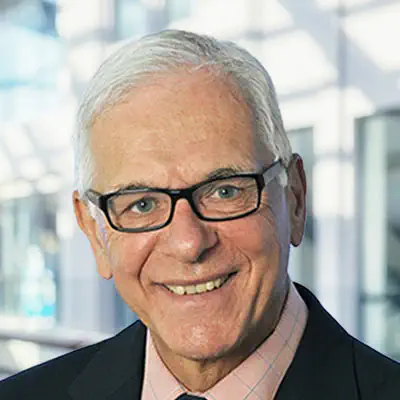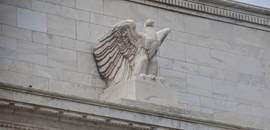With President Biden reappointing Jerome Powell to a second term as Fed chair and making Lael Brainard vice chair, he will have an opportunity to meet them privately. So why would I suggest President Biden should do what no other U.S. president has done and indicate he is on board for the Fed to raise rates in an election year?
To be sure, throughout the Fed’s history, the opposite tact has been more common: Lyndon Johnson, Richard Nixon, and more recently Donald Trump all jawboned the Fed to keep interest rates low to support the economy and their re-election prospects. The prime exception is Ronald Reagan. He inherited double-digit inflation and did not stand in the way of short-term interest rates reaching 20% during Paul Volcker’s tenure as Fed chair.
I base my argument on both economic and political considerations.
First, the U.S. economy is well on the way to a full recovery from the COVID-19 pandemic. The Federal Reserve’s latest projections call for GDP growth to be in the vicinity of 6% this year and 4% next year. The Fed also expects the unemployment rate, which has fallen to 4.6% in October from a peak of 15% last year, to decline below 4% next year, or nearly back to where it was before the pandemic.
Second, inflation has far exceeded the expectations of the Federal Reserve and many Americans. CPI inflation in October reached a 31-year high of 6.2% and 4.6% ex food and energy, and the Fed has upped its estimate of core inflation this year to 3.7% from 3.0%.
Labor market tightness is also evident in record job openings and quit rates, as well as increases in unit labor costs. While wage pressures have been greatest for lower-paying jobs, they may be spreading to large corporations. For example, the recent strike settlement for John Deere workers granted employees 10% pay bumps, bonuses of $8,500, and increased retirement benefits.
Third, this outcome is not only the result of supply-chain disruptions from the pandemic that have contributed to a temporary spike in inflation. It is also the result of highly expansionary policies.
According to Jason Furman, chair of the Council of Economic Advisors for the Obama administration, “the oversized and poorly designed $2.7 trillion fiscal relief packages” passed in December and March boosted aggregate demand when the economy already was experiencing a strong recovery. They gave individuals checks from the federal government of $2,000 each when many households had not fully spent the prior transfers they received.
In addition, the Federal Reserve’s accommodative monetary policy stance has contributed to lower long-term rates, higher stock prices, and other financial market changes that bolstered the economy. Furman maintains the easy financial market conditions have been the equivalent of more than a one percentage point cut in the federal-funds rate since the election in November 2020.
On the political front, public opinion polls show Biden’s approval rating slipping since midyear. This is due in part to the surge of the Delta variant and the chaotic withdrawal of U.S. troops from Afghanistan. But, these polls also increasingly reflect the public’s growing concern about inflation and the economy.
The NY Fed’s survey for October, for example, showed households now expect CPI inflation will be 5.7% in the next 12 months and will average 4.2% annually over the next three years. Moreover, consumer confidence as measured by the Michigan survey has failed to recover from the lows of the Delta wave due in part to concerns about inflation.
In these circumstances, President Biden is now under pressure to do something to stem inflation. He has argued that the bipartisan infrastructure bill that was recently enacted and the pending legislation to tackle climate change and expand the social safety net will help alleviate supply bottlenecks. However, few economists believe these programs will have an impact on the economy and inflation in the short-medium term.
So, what can Biden do to rectify the situation?
Journalist and author, Jeff Greenfield, argues that the reality is Joe Biden like his predecessors is playing with “an empty inflation toolbox.” The dilemma is
“Presidents have almost no power to ease the pain of inflation, and the voting public cuts presidents no slack at all because of that impotence.”
The job of tackling inflation of course resides with the Federal Reserve. Chair Jerome Powell has indicated the Fed is not contemplating raising interest rates before the tapering of its bond purchase program is completed in mid-2022. This means the first opportunity for it to raise rates would be around the 2022 mid-term elections. If so, it may feel compelled to stay on the sidelines and defer acting until 2023.
In my view, time is of the essence. In a recent interview, Harvard economist Kenneth Rogoff stated, “I think we’re on a knife edge” of where inflation is going, calling the latest readings “eye opening.” The Fed has been able to maintain investor confidence thus far because inflation has been low for the past two decades. However, there are indications inflation is creeping into Americans’ psyches as it did in the late 1960s.
Therefore, if inflation stays elevated, the Fed must be prepared to act without worrying about the political consequences. In the end, containing inflation would be positive for the economy’s long-term outlook as well as for President Biden’s reelection prospects.
To be sure, throughout the Fed’s history, the opposite tact has been more common: Lyndon Johnson, Richard Nixon, and more recently Donald Trump all jawboned the Fed to keep interest rates low to support the economy and their re-election prospects. The prime exception is Ronald Reagan. He inherited double-digit inflation and did not stand in the way of short-term interest rates reaching 20% during Paul Volcker’s tenure as Fed chair.
I base my argument on both economic and political considerations.
First, the U.S. economy is well on the way to a full recovery from the COVID-19 pandemic. The Federal Reserve’s latest projections call for GDP growth to be in the vicinity of 6% this year and 4% next year. The Fed also expects the unemployment rate, which has fallen to 4.6% in October from a peak of 15% last year, to decline below 4% next year, or nearly back to where it was before the pandemic.
Second, inflation has far exceeded the expectations of the Federal Reserve and many Americans. CPI inflation in October reached a 31-year high of 6.2% and 4.6% ex food and energy, and the Fed has upped its estimate of core inflation this year to 3.7% from 3.0%.
Labor market tightness is also evident in record job openings and quit rates, as well as increases in unit labor costs. While wage pressures have been greatest for lower-paying jobs, they may be spreading to large corporations. For example, the recent strike settlement for John Deere workers granted employees 10% pay bumps, bonuses of $8,500, and increased retirement benefits.
Third, this outcome is not only the result of supply-chain disruptions from the pandemic that have contributed to a temporary spike in inflation. It is also the result of highly expansionary policies.
According to Jason Furman, chair of the Council of Economic Advisors for the Obama administration, “the oversized and poorly designed $2.7 trillion fiscal relief packages” passed in December and March boosted aggregate demand when the economy already was experiencing a strong recovery. They gave individuals checks from the federal government of $2,000 each when many households had not fully spent the prior transfers they received.
In addition, the Federal Reserve’s accommodative monetary policy stance has contributed to lower long-term rates, higher stock prices, and other financial market changes that bolstered the economy. Furman maintains the easy financial market conditions have been the equivalent of more than a one percentage point cut in the federal-funds rate since the election in November 2020.
On the political front, public opinion polls show Biden’s approval rating slipping since midyear. This is due in part to the surge of the Delta variant and the chaotic withdrawal of U.S. troops from Afghanistan. But, these polls also increasingly reflect the public’s growing concern about inflation and the economy.
The NY Fed’s survey for October, for example, showed households now expect CPI inflation will be 5.7% in the next 12 months and will average 4.2% annually over the next three years. Moreover, consumer confidence as measured by the Michigan survey has failed to recover from the lows of the Delta wave due in part to concerns about inflation.
In these circumstances, President Biden is now under pressure to do something to stem inflation. He has argued that the bipartisan infrastructure bill that was recently enacted and the pending legislation to tackle climate change and expand the social safety net will help alleviate supply bottlenecks. However, few economists believe these programs will have an impact on the economy and inflation in the short-medium term.
So, what can Biden do to rectify the situation?
Journalist and author, Jeff Greenfield, argues that the reality is Joe Biden like his predecessors is playing with “an empty inflation toolbox.” The dilemma is
“Presidents have almost no power to ease the pain of inflation, and the voting public cuts presidents no slack at all because of that impotence.”
The job of tackling inflation of course resides with the Federal Reserve. Chair Jerome Powell has indicated the Fed is not contemplating raising interest rates before the tapering of its bond purchase program is completed in mid-2022. This means the first opportunity for it to raise rates would be around the 2022 mid-term elections. If so, it may feel compelled to stay on the sidelines and defer acting until 2023.
In my view, time is of the essence. In a recent interview, Harvard economist Kenneth Rogoff stated, “I think we’re on a knife edge” of where inflation is going, calling the latest readings “eye opening.” The Fed has been able to maintain investor confidence thus far because inflation has been low for the past two decades. However, there are indications inflation is creeping into Americans’ psyches as it did in the late 1960s.
Therefore, if inflation stays elevated, the Fed must be prepared to act without worrying about the political consequences. In the end, containing inflation would be positive for the economy’s long-term outlook as well as for President Biden’s reelection prospects.
A version of this article was posted to TheHill.com on November 22, 2021.
Past performance is not indicative of future results. This publication contains the current opinions of Fort Washington Investment Advisors, Inc. Such opinions are subject to change without notice. This publication has been distributed for informational purposes only and should not be considered as investment advice or a recommendation of any particular security, strategy, or investment product. Information and statistics contained herein have been obtained from sources believed to be reliable and are accurate to the best of our knowledge. No part of this publication may be reproduced in any form, or referred to in any other publication, without express written permission of Fort Washington Investment Advisors, Inc.























